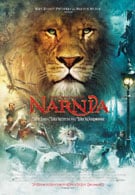There's too much talk about it in the media to ignore it: The Chronicles of Narnia has ties to Christianity. But don't let nightmare visions of molesting priests keep you from seeing it. This isn't a Christian movie, and in fact if Disney wasn't going out of their way to market the thing directly to church groups hoping for a Passion of the Christ cash-in, you wouldn't notice any sort of Christ connection while watching it. I'm sure a few of you were hoping for a soundtrack peppered with Amy Grant, but this isn't that kind of movie, no matter how much some people might like to see it sold as such.
Instead, in that sense it remains pretty faithful to the material on which it is based, C.S. Lewis's children's book. If the book has any connection to Christianity, it's as a loose allegory, and even then only in parts. C.S. Lewis wasn't a Christian author, he was an author who also happened to be a Christian, and a little of that worked its way into his ideas for the latter half of the novel. So let's move on and avoid blowing the movie's rather tenuous Jesus link out of proportion.
What The Chronicles of Narnia: The Lion, the Witch, and the Wardrobe really is, is a spectacular adaptation of a fairly nice fantasy tale. It doesn't just live up to its source material, it surpasses it by finding nuances in the story that C.S. Lewis didn't. That's not to say there's been anything added. Director Andrew Adamson follows a path that for the most part, sticks almost slavishly to the details of the book. But in between those details he finds emotional depth and resonance that isn't obviously there in the short, rather simplistic children's novel written by Lewis.
Hold on a minute, I'm talking about this movie as if you're all familiar with the story. For those of you who aren't, here's the gist. Four pre-adult siblings of varying ages (named Peter, Edmund, Susan, and Lucy Pevensie) step through a rather large coat closet and end up in another world. Think Wizard of Oz, only instead of a tornado it's a big, ornately carved wardrobe that's the youngsters' means of transportation. Where they end up is a place called Narnia, and it's enslaved by an evil witch. Narnia is a fantastical land, which I suppose is what makes this a fantasy film. It's full of animals, many of whom can talk, as well as things like unicorns, satyrs, fauns, griffins, and just about any other fantasy creature you can think of. And there's a Lion. He's not a tame Lion; in fact he's a lot like God. He's returning, and the four Pevensie children get caught up in a prophecy that pegs them as Narnia's savior.
For each of them, that leads somewhere different. Peter must find his strength as a leader and a warrior, Lucy as a caretaker and a healer, Susan must learn to believe in others, and Edmund… for Edmund it's about redemption. Bear in mind, these are kids being played by kids The oldest is almost certainly under 18, the youngest has a long way to go before pubescence. They're kids and there's no attempt to flog them into adults. They bicker and fight like siblings, and they are for the most part motivated by all the things kids think about. Finding and understanding that motivation I think is one of the things that puts this to a place beyond the book. Narnia the movie helps you understand what's driving these children, and as a result there's a level of emotion present in the film that's not really there in print. Adamson has keyed in on that and made it the heart of his movie, rather than battles or special effects. He finds an emotional core in C.S. Lewis's story that without this movie, you might never have suspected was there.
It probably helps that this is a simple story. It's not as big or epic as Lord of the Rings for example. Yes, there's a journey, but a relatively short one. Yes, there's a battle, but the focus of the battle is more on individual characters than on some massive, hugely scaled thing. The story Narnia has to work with is simple enough that there's plenty of room for giving each sequence a little something extra. Adamson and his team have nailed that. Take Aslan for instance. He's in the film a relatively short amount of time, but his presence is colossal. Voiced by Liam Neeson, he instantly becomes a person you love and respect. You get what it is about him that has the children and their companions so enthralled with very little screen time to build on. Adamson makes that screen time count.
The only serious flaw with the film is the effects, which look at times half done or rushed. I'm not saying the computer generated creatures don't look good, they do. This is a beautiful movie. The designs are interesting and believable, if nowhere near photorealistic. However, a lot of the time Narnia's great computer generated creatures don't blend in properly with the live action shots. It's a very subtle thing, and perhaps most people won't even notice it, but there were too many instances where I felt like I was watching Pete's Dragon redone with computers. The CGI characters often look like they've been overlaid on the film, rather than appearing as something that we can accept as living in it. It's more an issue of how these CGI creations (of which there are many in the film) interact with their environment. The thing is, for the most part, they don't. When they must, it's quick and sometimes blurred. There's at least one shot of Aslan walking on grass in which the spot where his feet meet the ground is inexplicably blurry. It's not a result of carelessness I think, but of being rushed. With more time and tweaking, these tiny problems could probably have been made to vanish.
Your Daily Blend of Entertainment News
Was Disney dashing to cash in on the post-LOTR interest in fantasy movies before it faded? Were they in a hurry to harness the current American religious fervor before it fades, and direct it towards ticket purchases? Who knows. Minute effects issues aside, this is otherwise a fantastic, affecting film with real thought and love for the material behind it. It's full of wide-eyed wonder and innocent delight, a different kind of fantasy from that found in the other great material we've seen from the genre as of late. C.S. Lewis's thinly developed novel leaves plenty of room for Adamson to let his imagination wild. With his help, Narnia takes flight.

